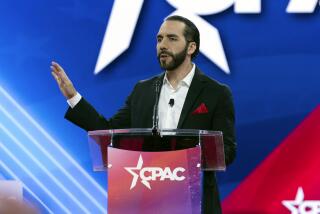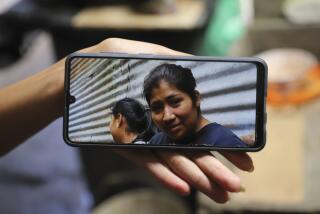Rene Emilio Ponce dies at 64; Salvadoran general blamed for killing of six priests during civil war in 1989
Reporting from San Salvador and Mexico City -- Rene Emilio Ponce, the once-powerful army general blamed for one of the most egregious atrocities in El Salvador’s civil war, the killing of six Roman Catholic priests, has died. He was 64.
Ponce died Monday at the Military Hospital in San Salvador, the capital, after being admitted last week in critical condition with heart trouble, El Salvador’s Defense Ministry said in a statement.
Ponce served as defense minister and army chief of staff in the last half of the Cold War-era conflict that ended in 1992, becoming one of the U.S.-backed government’s most important military strategists.
A United Nations truth commission after the war determined that Ponce had ordered the assassination of the country’s leading Jesuit priest, Ignacio Ellacuria, rector of the Jesuit-run University of Central America.
Ellacuria, suspected by the army of supporting leftist guerrillas, was slain on Nov. 16, 1989, along with five other priests, their housekeeper and her teenage daughter because the orders instructed that no witnesses be left behind, the commission said.
Though promoted to general a year after the massacre, Ponce was forced to step down as defense minister in 1993, when the commission’s report was released.
For most of the bitter, 12-year war, in which more than 75,000 people were killed in Central America’s smallest country, Ponce enjoyed the support of the Reagan and George H.W. Bush administrations even though — declassified diplomatic cables later revealed — U.S. officials were aware of his abysmal human rights record. The U.S. spent billions of dollars in the 1980s to equip and train the Salvadoran army and to shore up the government.
At the time of his death, Ponce faced a lawsuit in a Spanish court. The suit, filed by relatives of the slain priests, accuses Ponce and 13 other former military officers of assassination and crimes against humanity.
Unrepentant, apparently, to the end, Ponce always maintained that he and his 32,000-member army fulfilled their mission to stem “communist aggression.”
Though he rarely discussed the matter in public, Ponce told a Salvadoran interviewer in 2009 that he did not give the order to kill the Jesuits and that suggestions that he did so were part of a leftist conspiracy to besmirch his name.
“It is unjust because I dedicated 30 years of my life to defend my country, and in the most difficult moments I led the armed forces strategically to defend a system threatened by an internationally backed communist aggression,” he said.
“I regret nothing that I did in benefit of my nation … defending the institutionalism of the state and its constitutional system,” he added. “The Jesuits were victims of the circumstances.”
The Jesuits were killed at the height of a major guerrilla offensive that, for only the second time in the entire war, swept through the capital. It became a turning point in the conflict because it convinced most observers that neither the U.S.-backed right-wing government nor the Cuban-backed leftist guerrillas could win militarily. Peace negotiations began the next year.
Thanks in part to a postwar amnesty law, no senior military officer was punished for the Jesuits’ murders.
Much has changed in El Salvador since those years. The Farabundo Marti National Liberation Front, as the guerrillas who Ponce fought were known, is today a political party; its candidate was elected president in 2009.
Still, the death of Ponce revived memories and tensions Monday in a country that in many ways remains deeply polarized.
The Defense Ministry expressed “profound” sorrow for the death of “the distinguished general.” Army officials noted that Ponce was serving as president of the Salvadoran Military Veterans Assn. when he died, leading marches a couple of years ago to defend the amnesty law that shielded officers from prosecution.
But human rights activists said the only thing they were sorry about was that Ponce was never formally charged or tried.
“I regret that the general died with total impunity,” said Maria Silvia Guillen, head of an independent human rights organization. “I think it is sad that the Salvadoran people have lost an opportunity for the truth about who was responsible to be established officially, with first and last name.
“I would have hoped for a historic moment when justice could have been served.”
Ponce was born in 1947 in the city of Sensuntepeque in El Salvador’s central Cabanas province, an area that saw heavy fighting during the war. He was part of the much-feared 1966 military graduating class known as La Tandona, whose members eventually dominated the top ranks of El Salvador’s armed forces.
Ponce is survived by his wife and three children.
Special correspondent Renderos reported from San Salvador; Wilkinson from Mexico City.
More to Read
Start your day right
Sign up for Essential California for the L.A. Times biggest news, features and recommendations in your inbox six days a week.
You may occasionally receive promotional content from the Los Angeles Times.







